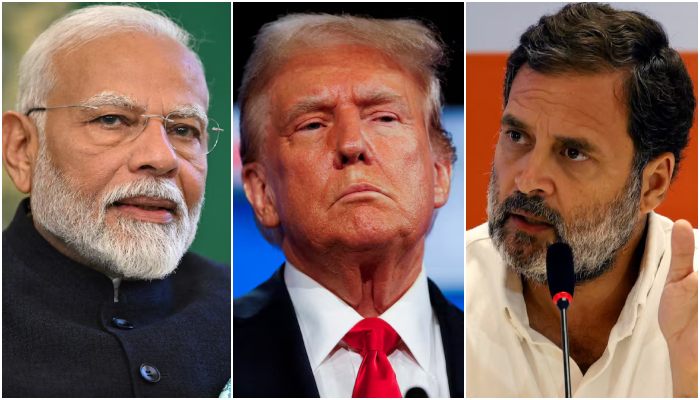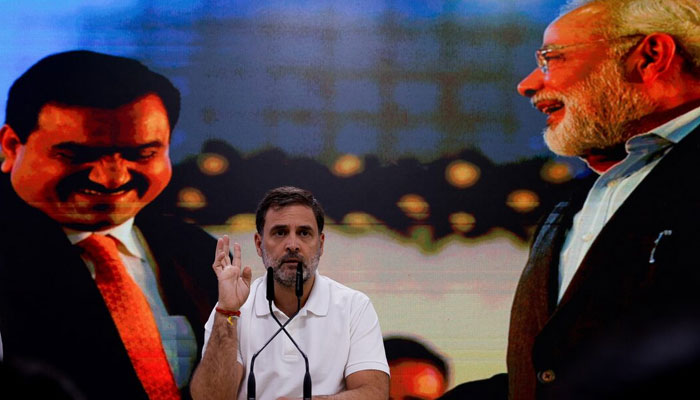
India’s Opposition Leader Rahul Gandhi on Wednesday assailed Prime Minister Narendra Modi for not being able to stand up to US President Donald Trump due to ongoing probe into Gautam Adani — business tycoon considered a close ally of the prime minister.
“The reason PM Modi cannot stand up to President Trump despite his repeated threats is the ongoing US investigation into Adani. One threat is to expose the financial links between Modi, AA, and Russian oil deals,” Gandhi said in a post on X.
“Modi’s hands are tied,” the politician added.
The Indian National Congress (INC) leader’s remarks refer to the US investigation into alleged bribes paid by Adani to secure lucrative government contracts.
Apart from the US probe, Adani Group, along with its 13 offshore investors, is facing an investigation by the Securities and Exchange Board of India (SEBI) since Hindenburg Research in 2023 alleged the group’s improper use of tax havens. The group has consistently denied any wrongdoing.
The Russian oil deal remarks made by Gandhi are to be taken against the backdrop of New Delhi’s purchase of Russian oil, which has become a point of contention between India and the US.
President Trump, who is rather unhappy with India’s dealings with Russia, has threatened to further increase tariffs from current 25% on Indian goods.
“They’re fuelling the war machine, and if they’re going to do that, then I’m not going to be happy,” Trump said a day earlier.
Adani, 62, is the owner of the Adani Group which has interests in everything from power generation and Australian coal mines to cement, media, food, airport terminals and Israeli ports.
The meteoric rise in the share prices of Adani’s units — the flagship Adani Enterprises rose more than 1,000% in five years — helped make the conglomerate staggeringly wealthy and fund further expansion.
The tycoon’s conglomerate offered Modi the use of a private company jet during the 2014 election campaign that swept his Hindu-nationalist Bharatiya Janata Party (BJP) to office.
A few years ago Adani executed a hostile takeover of broadcaster NDTV, a television news service considered one of the few media outlets willing to outwardly criticise Modi.
Adani batted away press freedom fears, but told the Financial Times that journalists should have the “courage” to say “when the government is doing the right thing every day”.
Bribery allegations
In November 2024, the Adani Group was indicted with accusations of paying more than $250 million to Indian government officials to secure lucrative contracts worth more than $2 billion.
It further charges Adani and seven other officials with lying about the bribery in order to raise capital from international investors, including those in the US.
In June of 2020, a renewable energy company owned by Indian billionaire Gautam Adani won what it called the single largest solar development bid ever awarded: an agreement to supply 8 gigawatts of electricity to a state-owned power company.
But there was a problem. Local power companies did not want to pay the prices the state company was offering, jeopardising the deal, according to US authorities. To save the deal, Adani allegedly decided to bribe local officials to persuade them to buy the electricity.
The alleged hundreds of millions of dollars in bribes promised to local Indian officials caught the attention of the US Justice Department and Securities and Exchange Commission as Adani’s companies were raising funds from US-based investors in several transactions starting in 2021.
This account of how the alleged scheme unfolded is drawn from federal prosecutors’ 54-page criminal indictment of Adani and seven of his associates and two parallel civil SEC complaints, which extensively cite electronic messages between the scheme’s alleged participants.
In early 2020, the Solar Energy Corporation of India awarded Adani Green Energy and another company, Azure Power Global, contracts for a 12-gigawatt solar energy project, expected to yield billions of dollars in revenue for both companies, according to the indictment.
It was a major step forward for Adani Green Energy, run by Adani’s nephew, Sagar Adani. Up until that point, the company had only earned roughly $50 million in its history and had yet to turn a profit, according to the SEC complaint.
But the initiative soon hit roadblocks. Local state electricity distributors were reluctant to commit to buying the new solar power, expecting prices to fall in the future, according to an April 7, 2021 report by the Institute for Energy Economics and Financial Analysis, a think tank.
Sagar Adani and the Azure CEO at the time discussed the delays and hinted at bribes on the encrypted messaging application WhatsApp, according to the SEC.
When the Azure CEO wrote on November 24, 2020, that the local power companies “are being motivated,” Sagar Adani allegedly replied, “Yup […] but the optics are very difficult to cover. In February 2021, Sagar Adani allegedly wrote to the CEO, “Just so you know, we have doubled the incentives to push for these acceptances.”
The SEC did not name the Azure CEO as a defendant, but Azure’s securities filings show the CEO at the time was Ranjit Gupta.
Gupta was charged by the Justice Department with conspiracy to violate an anti-bribery law. He did not immediately respond to a request for comment.
Earlier this year, Adani and his companies’ representatives met Trump administration officials seeking dismissal of criminal charges in the bribery probe, Bloomberg reported in May, citing people familiar with the matter.
In June 2025, Adani denied any wrongdoing in response to US allegations of bribery, telling shareholders that no individual from the group has been charged under the US Foreign Corrupt Practices Act (FCPA).
“Despite all the noise, the facts are that no one from the Adani Group has been charged with violating the FCPA or conspiring to obstruct justice,” Adani said at the company’s annual general meeting.
“Even in the face of the storms and relentless scrutiny, the Adani Group has never backed down,” he said.
— With additional input from AFP








